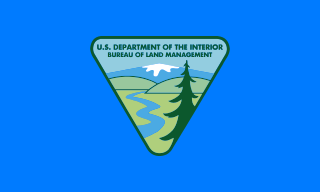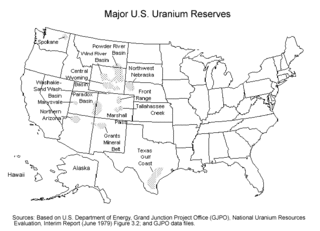Related Research Articles

The Bureau of Land Management (BLM) is an agency within the United States Department of the Interior responsible for administering public lands. With oversight over 247.3 million acres (1,001,000 km2), it governs one eighth of the country's landmass.

The General Mining Act of 1872 is a United States federal law that authorizes and governs prospecting and mining for economic minerals, such as gold, platinum, and silver, on federal public lands. This law, approved on May 10, 1872, codified the informal system of acquiring and protecting mining claims on public land, formed by prospectors in California and Nevada from the late 1840s through the 1860s, such as during the California Gold Rush. All citizens of the United States of America 18 years or older have the right under the 1872 mining law to locate a lode or placer (gravel) mining claim on federal lands open to mineral entry. These claims may be located once a discovery of a locatable mineral is made. Locatable minerals include but are not limited to platinum, gold, silver, copper, lead, zinc, uranium and tungsten.
The United States Senate Committee on Energy and Natural Resources has jurisdiction over matters related to energy and nuclear waste policy, territorial policy, native Hawaiian matters, and public lands.

For most of the 20th century, the United States Bureau of Mines (USBM) was the primary United States government agency conducting scientific research and disseminating information on the extraction, processing, use, and conservation of mineral resources. The Bureau was abolished in 1996.
The United States House Committee on Financial Services, also referred to as the House Banking Committee and previously known as the Committee on Banking and Currency, is the committee of the United States House of Representatives that oversees the entire financial services industry, including the securities, insurance, banking and housing industries. The Financial Services Committee also oversees the work of the Federal Reserve, the United States Department of the Treasury, the U.S. Securities and Exchange Commission and other financial services regulators. It is currently chaired by Democrat Maxine Waters from California. Waters was elected as chair of the committee, and assumed office on January 3, 2019.

The 39th United States Congress was a meeting of the legislative branch of the United States federal government, consisting of the United States Senate and the United States House of Representatives. It met in Washington, D.C. from March 4, 1865, to March 4, 1867, during the first month of Abraham Lincoln's fifth year as president, and the first two years of the administration of his successor, U.S. President Andrew Johnson.
The National Mining Association (NMA) is a United States trade organization that lists itself as the voice of the mining industry in Washington, D.C. NMA was formed in 1995, and has more than 300 corporate members.

The U.S. House Committee on Natural Resources or Natural Resources Committee is a Congressional committee of the United States House of Representatives. Originally called the Committee on Interior and Insular Affairs (1951), the name was changed to the Committee on Natural Resources in 1991. The name was shortened to the Committee on Resources in 1995 by the new Chairman, Don Young. Following the Democratic takeover of the House of Representatives in 2006, the name of the committee was changed back to its title used between 1991 and 1995.
The United States House Committee on Expenditures in the Navy Department is a defunct committee of the U.S. House of Representatives.

Uranium mining is the process of extraction of uranium ore from the ground. The worldwide production of uranium in 2019 amounted to 53,656 tonnes. Kazakhstan, Canada, and Australia were the top three producers and together account for 68% of world uranium production. Other important uranium producing countries in excess of 1,000 tonnes per year were Namibia, Niger, Russia, Uzbekistan and China. Uranium from mining is used almost entirely as fuel for nuclear power plants.

Uranium mining in the United States produced 173,875 pounds (78.9 tonnes) of U3O8 in 2019, 88% lower than the 2018 production of 1,447,945 pounds (656.8 tonnes) of U3O8 and the lowest US annual production since 1948. The 2019 production represents 0.3% of the anticipated uranium fuel requirements of the US's nuclear power reactors for the year.
The United States House Natural Resources Subcommittee on Energy and Mineral Resources is one of the five subcommittees within the House Natural Resources Committee

An abandoned mine is a mine or quarry which is no longer producing or operational, though definitions vary.
The Ministry of Mines, a branch of the Government of India, is the apex body for formulation and administration of the rules and regulations and laws relating to mines in India. The head of the ministry is Pralhad Joshi since June 2019.
Mining in the United States has been active since the beginning of colonial times, but became a major industry in the 19th century with a number of new mineral discoveries causing a series of mining rushes. In 2015, the value of coal, metals, and industrial minerals mined in the United States was US $109.6 billion. 158,000 workers were directly employed by the mining industry.

The Ministry of Mineral Resources (MMR) Sierra Leone is located on the 5th Floor Youyi Building, Brookfields, Freetown, Sierra Leone. Further to this the MMR Geological Surveys Department can be found at the New England estate, also in Freetown. The Ministry also supports a network of Regional Office in Makeni, Bo, Kenema and Kono, each headed by a Government Mines Engineer.

The National Strategic and Critical Minerals Production Act of 2013 is a bill that was introduced into the United States House of Representatives during the 113th United States Congress. The bill would alter the rules and regulations surrounding getting permits/permission to undertake mining projects in the United States. The bill would also alter that legal framework associated with this type of mining.

The Preventing Government Waste and Protecting Coal Mining Jobs in America is a bill that would amend the Surface Mining Control and Reclamation Act of 1977 to require state programs for regulation of surface coal mining to incorporate the necessary rule concerning excess spoil, coal mine waste, and buffers for perennial and intermittent streams published by the Office of Surface Mining Reclamation and Enforcement on December 12, 2008.

The Federal Coal Mine Safety Act of 1952 is a U.S. law authorizing the federal government to conduct annual inspections of underground coal mines with more than 15 workers, and gave the United States Bureau of Mines the authority to shut down a mine in cases of "imminent danger." The Act authorized the assessment of civil penalties against mine operators for failing to comply with an order to shut down or for refusing to give inspectors access to mine property. The law did not authorize monetary penalties for noncompliance with the safety provisions. In 1966, Congress extended coverage to all underground coal mines.
References
- Records of the Committee on Mines and Mining (1865- 1946), Records of the Committee on Interior and Insular Affairs and Its Predecessors, Guide to the Records of the U.S. House of Representatives at the National Archives, 1789-1989 (Record Group 233), National Archives and Records Administration
![]()